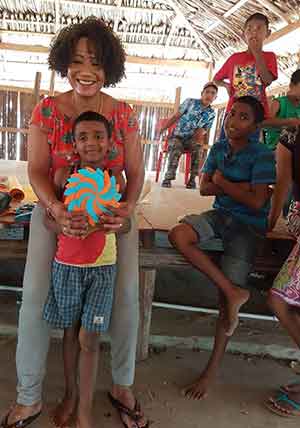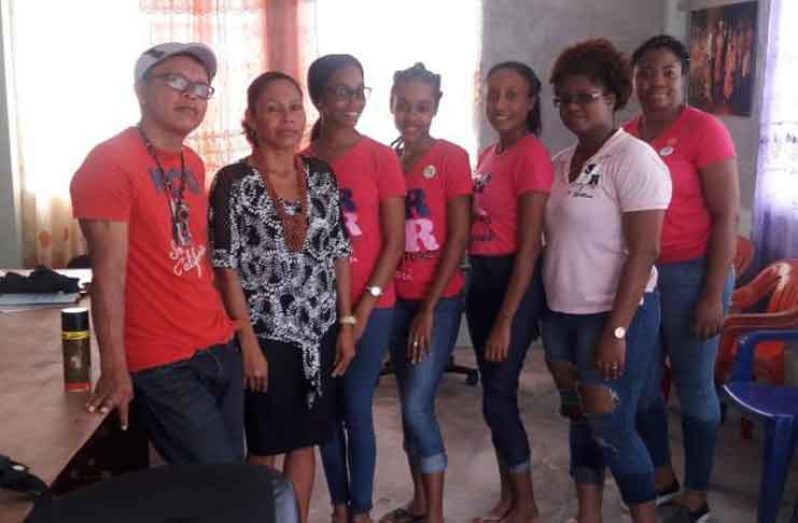SRHR Adventures conducts outreach
LEADING a Sexual and Reproductive Health Rights (SRHR) team on a recent trip to the Pakuri Village, better known as St. Cuthbert’s Mission, was Dr. Faqueeda Watson, who said that the trip was a very rewarding one.

The purpose of the visit, which took place on June 23, was primarily to spread the message of good health and hygiene management, especially as it related to matters of family planning and reproductive health; also planned as part of the day’s activities was a craft session for the community, which was facilitated by Leona DaCosta-Cumberbatch.
“We work as hard as we play,” said Dr. Watson who reported that although not as many members of the community turned out for the sessions, she was still quite pleased with the response, as well as the level of interaction from those who turned up.
Snaking their way in
Turning in the road leading to St. Cuthbert’s from the Linden-Soesdyke Highway, the team started another long journey ‘snaking’ their way into the mission because of the state of the road.
The team eventually reached into the community, made a brief stop to cement administrative matters and then headed to meet Toshao Beverley Clenkian, as well as members of the community.
FAMILY PLANNING
Subsequently, there was a brief meeting with the Toshao and other officials, after which the SRHR members were led to the Pakuri Benab for the start of the various meetings with members of the community.
The team explained to the gathering that SRHR Adventures is an initiative that seeks to raise awareness of sexual and reproductive health and rights with a special focus on family planning/contraception in Guyana. Since the establishment of the group, they have facilitated several awareness sessions on family planning, adolescent pregnancy, abortion and other SRHR topics.

Family planning, it was indicated, is everybody’s business, and especially for couples who need to make decisions about the desired number of children they would like to have, as well as the spacing and timing of their births.
Members of the community were urged to make themselves available for the services of family planning and birth control, which are viewed as integral to how families determine the number and timing of their children. It was said that the importance of these services is generally seen as a human right issue; as a population and environmental concern; as a personal and public health issue; and is also connected to social and economic development within the society.
HYGIENE MANAGEMENT
Dr. Watson spoke about the menstrual cycle and the types of materials that were used by women in taking care of themselves, explaining that it is a natural biological process of a woman’s life in which the survival and propagation of our species depend on it. Women, she said, have an estimated 450 periods during their lifetime.
Disposable pads were also distributed to some of the ladies within the Pakuri community. The team stated that the very first disposable pads were thought up by nurses, looking for new methods to stop excessive bleeding, particularly on the battlefield. They were made from wood pulp bandages and they were very absorbent and cheap enough to throw away afterwards.
 Many of the ladies in attendance at the family planning sessions were given reusable sanitary napkins that consisted of a shield that has “wings” which is secured to the underwear with a clip piece, and two liners that can be placed within the shield based on the menstrual flow. This sanitary napkin which usually comes within a kit can last for four years once cared for correctly i.e. wash it after every use with blue soap and water then placed to be dried in the sun. Within the kit, there is a calendar to monitor the female menstrual cycle as well.
Many of the ladies in attendance at the family planning sessions were given reusable sanitary napkins that consisted of a shield that has “wings” which is secured to the underwear with a clip piece, and two liners that can be placed within the shield based on the menstrual flow. This sanitary napkin which usually comes within a kit can last for four years once cared for correctly i.e. wash it after every use with blue soap and water then placed to be dried in the sun. Within the kit, there is a calendar to monitor the female menstrual cycle as well.
The ladies were also told that there are many benefits from using the reusable sanitary napkin such as it saves money; that it does not consist of harmful chemicals and it is environmentally friendly, fun and empowering because they are bursting with colour, patterns and unique designs.
The craft sessions were also very interactive. Members of SRHR Adventures were very pleased with the response they received from members of the community who turned up to take part in the sessions. “We were expecting many more people from the community to turn up, but we understand that because of the weather and so on more did not come,” one member stated, adding that the team was still happy with the response they received and that the evidence is there to show some of the items that were produced, from which the others may also learn. The sessions were held for both children and adults.
The team returned to Georgetown, saying that they are much encouraged and ready to go again with further plans to educate other communities in Guyana. (mercilinburke2017@gmail.com)



.jpg)










